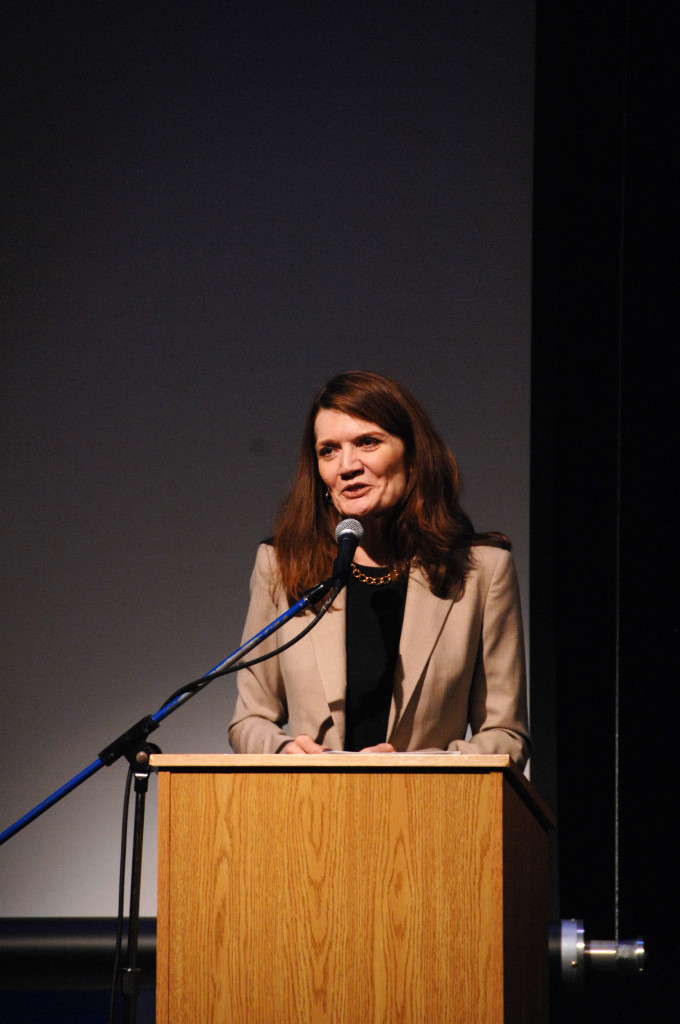
Photo by Jacob Cader
On the evening of this year’s second Assembly After Dark session, a group of parents and faculty gathered in the Stu-Fac, eagerly awaiting the arrival of Jeannette Walls, author of The Glass Castle. Walls’ book, a memoir, was the most recent summer reading book for the Upper School. But students weren’t the only ones engrossed in the riveting chronicle of Walls’ dysfunctional childhood; many parents also read and discussed her story. The Assembly After Dark presented an opportunity for Fieldston parents to hear Walls herself discuss the lessons and insights her bestseller has to offer.
Walls’ stage presence was powerful. Standing at almost six feet tall with movie star cheekbones, her southern twang grew when she spoke about her mother. Once Walls began to speak, she did not stop once over the course of the entire fifty-seven minute lecture.
Walls began with the moment when she realized that she could no longer live a lie – when she was sitting in the back of a taxi headed to an upscale party and she saw her homeless mother rooting through some garbage outside. A few days later, her mother challenged Walls to tell the truth about her life. Walls recalled “looking in the mirror and seeing a hypocrite.” While spending time as a gossip columnist searching for celebrities’ secrets,” she had managed to conveniently switch the subject every time she was questioned about her past. As her father had taught her to do during one of their hunts for the “demon” that lived under her bed, Walls decided to turn around and face the real demon – her past – head on. She noted that “the past always has a way of catching up with you, so you might as well put it to work”.
Walls then revealed one of her primary goals for Castle: she wanted it to touch “a rich kid and a poor kid”. She said that she would have been happy if even one child who read her book was similar to those who used to bully her, and might think again before picking on the girl with dirty clothes who smelled a bit funny. She also wished that The Glass Castle would give hope to kids like her who also ended up “on the wrong side of the tracks,” teaching them that they aren’t alone and deserve a good life.
Walls characterized The Glass Castle as having a quality that could reach people from both ends of the spectrum, an aspect of universality that has the capacity to open anyone’s eyes. This ability, she explained, is supported by the immense power of storytelling – she noted that memoirs “allow the readers to walk in other peoples’ shoes.” Walls was painfully nervous that people would fail to understand her story, and writing it helped her take down a barrier that had been up for so long. “Now, people feel compelled to just come up to me and tell me their story,” Walls said. “I think The Glass Castle gives people courage to face their own story. Now, I never have small talk with people I meet – they go instantly into dissecting how my mother was similar to theirs.” Walls said that if the audience leaves thinking about her life, and not their own, then she really hasn’t done her job.
Throughout the night Walls scattered several stories that are also told in the memoir, namely, her “most treasured gift ever,” the planet Venus, and her father’s promise of the Glass Castle. Her wishes for the Castle exemplified Walls’ firm outlook that “everything is either a blessing or a curse and it’s up to you to decide what you make of it.” When she was old enough to realize that the Glass Castle was yet another empty promise made by her father, she “decided to go out and build her own” by moving to New York City and taking control of her future.
Walls held to this type of optimistic and pragmatic approach throughout the night, attributing it to her mother’s fierce optimism that she also referred to as “loopiness.” “My mother can put a positive spin on anything,” she said. “One time when we were on Oprah and she was asked about how it was to be homeless, she replied, ‘I was never homeless.’ When I insisted that ‘No mom, you were, you lived under the Washington bridge for six weeks,’ she retorted, ‘Yes, and that was my home.”
While her father instilled courage in Walls and her mother instilled optimism, together they taught all of their children how to dream. Walls remembered thinking, “Although we may not have food or heat, at least my parents never make fun of our dreams…they gave them to us.” She stressed that “education and hope go hand-in-hand.” Through experiential learning and exposure to the world around her, Walls learned that education was one of the fundamental tools in life. Despite being an empty promise, the Glass Castle was more importantly a combination of hope and education.






